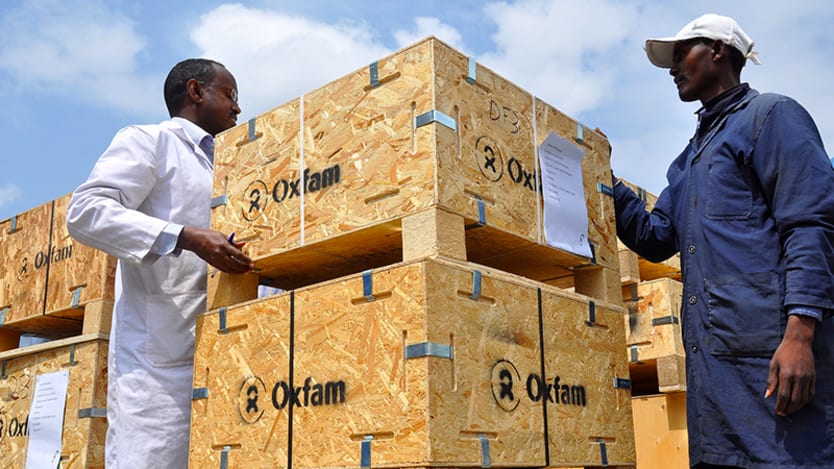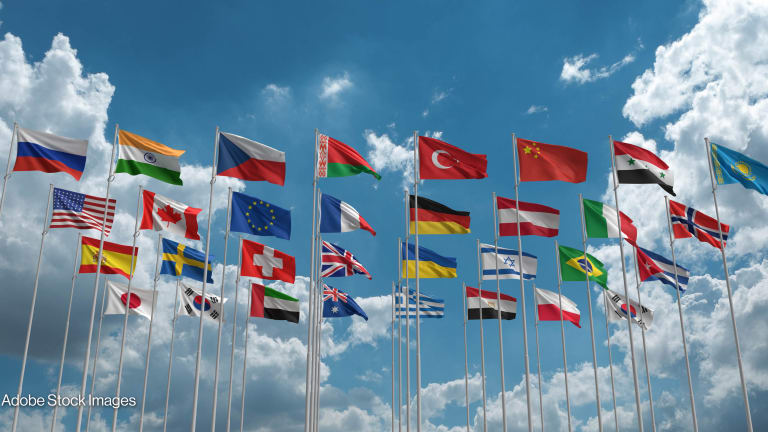
Between our broken global economic model, rising inequality, and the erosion of democracy and human rights, we are living in a time of crisis. But there are, in times of crisis, new possibilities for transformation.
We are living not only in an era of change but in a change of era. The flawed 20th-century international system is ending — and it has to. But what replaces it could either build on its successes or collapse its very real gains. As a civil society leader, it is simultaneously frightening, exciting, confusing, challenging, and demanding to navigate such times. In the face of such change, the temptation can be to stop or slow down, as things look too risky. But it is clear now that it is also too risky to stay the same.
Six years ago, as the new executive director of Oxfam International, seeing the outlines of some of these trends, my colleagues and I agreed to a set of interconnected changes that we would embark on. We would shift the balance of the organization from one in which power was concentrated in the North to one in which it was truly shared across the world. As part of that, we decided to shift our international headquarters from Oxford to Nairobi, build up more member organizations — “affiliates” — from the global south, and recruit a more diverse leadership.
To change the rules, we need to help shift who decides the rules. Decisions made by elites will generally favor elites.
—We would shift from an approach that sometimes looked too much like delivering for people to one that focused on acting in solidarity and supporting the ability of people to address the challenges their countries faced. As part of that, we agreed upon a more localized approach to humanitarian work that strengthened countries’ governments’ and citizens’ own adaptive capacity to prepare for and respond to crises; and to ensure that our development work strengthened not only communities’ livelihoods and capabilities but also their voice.
We would shift from an approach where Oxfam would learn, set out, advocate, and campaign for its own in-house solutions, to one where Oxfam amplified the voices of others, and where government policy failures were recognized not only as technical problems to be addressed with technical solutions but as a consequence of an imbalanced relationship that left people who were in poverty without enough collective power.
As part of that, we agreed to focus more on supporting social movements and alliances where Oxfam’s influence and Oxfam’s brand prominence would be much less, but by being part of something much bigger, and by being part of building up citizens’ own power, we would be part of much greater, more sustainable change. When citizens assert themselves and link with each other in solidarity across countries, they can realize more just and equal societies. In both the North and the South a resurgence of social movements is essential.
Nonprofits are carving their own impact investing niche
The average number of employees working full-time on impact investing for international NGOs has nearly doubled since 2016, according to a new report.
None of these changes have been easy for Oxfam. There have been so many reasons to pull back or revert. Not everyone has wanted to shift in ways that can be seen as disrespecting former, well-established norms. Not everyone has been happy to give up power and control. Fears and concerns, often rooted in very valid, real challenges, can paralyze.
Moving collectively forward can be held back by nationally-driven incentives and the worries of some donors, governments, influentials or publics in some countries. But, with necessary debate and discussion, adaptation and reassurance, we moved forward — not as fast as I wanted or called for, but faster than many who helped drive the change had thought possible. We are rightly proud of how far we have come.
But now in this change of era, we have no time to rest on our laurels, and, after much change, must change much more. We are called by the founders of our organizations to be courageous — to fulfill the unfinished transformation we set out, and, indeed, to go further than we once imagined.
Oxfam needs to be, and be seen to be, rooted in membership across the world, a globally balanced organization that speaks with authority. We must ensure that we strengthen our center in the South — Nairobi — both as a symbol and substantively, to be driven by voices from the South who have historically been locked out of an equal voice in development, as much as by the North.
For Pro subscribers: Humanitarian leadership fails on diversity
New research by the Humanitarian Advisory Group on the diversity of humanitarian leadership has delivered concerning results.
Oxfam needs to demonstrably strengthen people’s power in all its work, including in response to crises. The root causes of disasters and conflicts are not able to be addressed by the existing multilateral system. We need to push boldly for radical change in the multilateral system and lead by example in how we respond.
Oxfam needs to be part of the global movement for social justice. We have learnt, may I say, from painful experience, that one cannot take on powerful corporations and political leaders while upsetting no one. Fighting inequality is rightly disruptive. Our calling to challenge the economic model that counts growth numbers and not people's well-being means we must devote all our strength to building movements for change with workers, faith leaders, artists, and activists, getting out of NGOism, projectisation and brand obsession. As part of this, we must wean ourselves off an institutional dependence on institutional aid.
One factor making transformation vital has been the painful but necessary spotlight shone on the much-publicized failures of NGOs, including Oxfam, to prevent exploitation of vulnerable women in crises, to properly empower and listen to survivors, communities, and whistleblowers.
The “Me Too” earthquake is continuing to shake the NGO sector — and rightly so. People demand of us, as they should, that we live our values and never protect ourselves over them. And countries in the South demand, as they should, that our support should never be tinged with privilege of race or class. One response to the NGO crisis could be to shrink away from a politically challenging role or to look only in terms of tightening essential controls.
But this would be a mistake. We must instead embrace boldly the more profound lessons of the crisis that our job is to strengthen the voices of the least heard, to help shift power to people, and so redress involves also shifting our way of working and our structures and systems of power. Women are organizing to assert themselves, claiming more than was won in the twentieth century and refusing to accept patriarchy in any form. We are called to be part of a gender equality revolution and we in civil society must be uncompromisingly feminist in our approach.
A second factor making transformation vital is that the international context — the post-World War II institutions and norms that had framed our work — has undergone such massive change that old ways of working don’t apply now.
A third factor is that communities in the South — those who are the focus of INGOs work — will not respect or even accept engagement that however well-meaning has any sense of being patronizing or of being help from above.
And a fourth factor is that in an age of extreme inequality, where powerful elites are suppressing citizens to maintain their control, any approach rooted in one INGO — testing, learning, and advocating — will simply not work. Development is about power — who has it — and so our advocacy for progressive policies will only succeed at scale when the collective power of ordinary people is strengthened through the building of social movements and alliances.
To change the rules, we need to help shift who decides the rules. Decisions made by elites will generally favor elites, however well we advocate to them, however good our research. But when movements build strong collective power, transformative social change can happen: that’s how our forebears won the fights against slavery, colonialism, apartheid, and crushing debt.
In this new era there are many dangers, but one of them is standing still.
While we can rightly be proud of how far we have come, we can also see that we have left one shore and not yet reached the other one. Staying still, or slowing down, or even simply maintaining our current pace of change would not only result in failing to seize the opportunities to build a more equal world, it would result too in our own end as INGOs. The extent and speed of change in the external world requires a commensurate response. To be frank, we are behind the times. We must catch up, and overtake, or we, and the millions we work alongside, will be left behind.
The solutions to our unjust world are to be found in citizens challenging the imbalance of power and wealth, joining together with others in collective struggles for dignity and the right to shape their own destiny. Oxfam's role is to be on their side, and at their side. To do that we must speed up our journey to reinvent ourselves, fast. In all this, though I remain hopeful.
The people who join organizations like ours are amongst the most inspiring one can ever meet - thousands and thousands of mission-driven, committed, innovative, and brave people - determined not to accept what cannot be changed but to change what cannot be accepted. What might normally seem impossible seems merely difficult. And so, every day I have gone to work, I believed that we would succeed, and succeed we did. Aluta continua!








